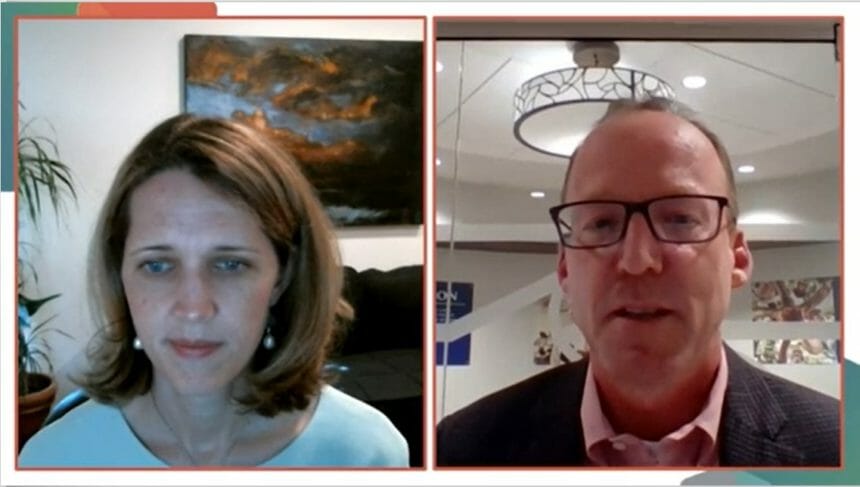COVID-19 has served as an unanticipated stress test for the senior living industry, from policies and structures that worked well — or not — and opportunities for innovation across operational and legal areas.
Andrew Joseph, general counsel at Frederick, MD-based Asbury Communities, said that COVID-19 has highlighted things the industry did really well and things that need more work. Joseph was joined by Bethany Ghassemi, general counsel at Pleasanton, CA-based HumanGood, on a LeadingAge Annual Meeting Virtual Experience panel discussing legal and operational issues during the pandemic.
What went right
HumanGood benefitted from its size and combined expertise, with its leadership team focused on IT, data and technology, Ghassemi said.
“We hit the ground running, in terms of working remotely at a corporate level and a digital transformation initiative that started before the pandemic that had us ready with the tools to gather data, particularly with testing and other metrics that became important to respond to the pandemic,” she said. “Using technology to allow us to create cross-functional teams that could evolve and respond in real time was really helpful for us.”
Joseph said that communicating to outward-looking stakeholders, including families of residents, was not something Asbury Communities was doing before he pandemic. But it was something he anticipates the company will continue, he said, adding that Asbury’s corporate office is considering adding positions to support communication.
“One thing we didn’t anticipate in the beginning was how difficult separation from family and loved ones would be for our residents,” Joseph said.
Staff members, he added, were pushed to perform many administrative functions to maintain the health and safety of residents. At the same time, they became a large component in the lives of residents whose families could not provide one-on-one caregiving.
“Caregivers and clinicians were not only stressed to meet the administrative stuff, but they also had to fill a huge emotional gap,” Joseph said.
COVID, Ghassemi said, was an opportunity to improve HumanGood’s cross-functional work. One thing she said she learned is how different the company’s business lines are, especially legally. As healthcare providers, she said HumanGood has the authority and mandate to assert a certain level of control over what goes on in its communities and how its residents live. But replicating the “fortress-like” conditions of its skilled nursing facilities was not a workable approach for its affordable senior housing communities.
“There are a lot of ways we’re not legally allowed to assert control over how they live their lives,” Ghassemi said.
Joseph agreed that COVID-109 highlighted that “you can’t paint different business lines with the same brush.”
What didn’t work
One thing COVID brought to the forefront, Ghassemi said, is the importance of having a common system, not just across the organization but integrated among communities and the corporate level.
“At a corporate level, when you have to make big decisions quickly, you need to know what’s going on in your communities,” he said. “We’re seeing the importance of a centralized approach — a ‘command center’ that knows what’s going on that quickly and nimbly adapt at the community level.”
Joseph said that COVID-19 was a test of organizations’ governance structures, whether boards were micromanagers or under-involved in communities.
Access
Another issue that became pronounced in communities was access. Joseph said Asbury Communities provides many services but allows freedom of choice. The question, then, became how to control access to communities at the beginning of the pandemic and how to ensure that outside individuals essentially are at the same level, in terms of testing and safety, as a community’s own employees.
Access demands vary by community, Ghassemi added. She said that she has some communities where almost all residents are on board with treating the community like a fortress, whereas other communities are “imploring the executive director to look the other way so they can literally break into the pool.”
“You have to strike a balance between very opposite ends of the spectrum,” Joseph said.
Agent of change
COVID resulted in several changes at HumanGood that Ghassemi said she does not see being reversed post-pandemic, including operating efficiencies.
“Those efficiencies you found, obviously, are going to carry forward at a more macro level, in terms of the industry,” she said. Technology and the importance of forward-looking uses of data and technology, are other important permanent changes, Ghassemi added.
“Our whole value proposition has shifted a bit,” she said, adding that the care and safety provided by senior living and care compared with living at home resonates with residents. “Quality of care and connectivity is still important, compared to someone in their home who doesn’t have friends living nearby and healthcare accessible at their fingertips.”
The meeting continues Wednesday and Thursday of this week as well as Tuesday through Thursday next week.



